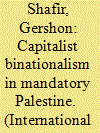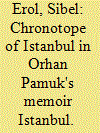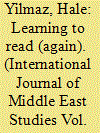|
|
|
Sort Order |
|
|
|
Items / Page
|
|
|
|
|
|
|
| Srl | Item |
| 1 |
ID:
108814


|
|
|
|
|
| Publication |
2011.
|
| Summary/Abstract |
In response to the outbreak of the Arab Revolt of 1936, a coterie of five prominent entrepreneurs and intellectuals in the Mandatory Jewish community formulated a capitalist binationalist resolution of the Israeli-Palestinian conflict. This paper examines the genesis of and debate over the little-known Concord they proposed and compares it with better-known liberal and socialist binationalist plans. "The Five," as they came to be known, were the only binationalists seeking to base political parity on economic integration. The occasion of their blueprint allows further exploration of the preconditions for an effective binationalist program, among them the structure of labor markets, political preferences of minorities and majorities in regard to sovereignty, and levels of mutual trust. Ultimately, binationalist resolutions of the Israeli-Palestinian conflict were precluded by the Labor Settlement Movement's separatist state-building strategy.
|
|
|
|
|
|
|
|
|
|
|
|
|
|
|
|
| 2 |
ID:
108821


|
|
|
|
|
| Publication |
2011.
|
| Summary/Abstract |
In his memoir Istanbul, Orhan Pamuk argues that Istanbul is the site of intense hüzün (melancholy) caused by the loss of the Ottoman Empire. Furthermore, like other inhabitants of the city, that is, Istanbullus, his life is imbued with this inescapable melancholy. Taking issue with the apparent anachronism of Pamuk's historical argument, I show how he constructs and naturalizes this association between Istanbul, melancholy, and loss of empire by creating a literary genealogy for his claim. Using the Bakhtinian concept of chronotope (a schema that recognizes and explains the patterns of fusion of time, space, and emotion as thematic constellation or narrative pattern), I argue that what Pamuk identifies in and derives from the writings of his predecessors is the chronotope of Istanbul. I show how Pamuk constructs the hybrid literary canon and tradition (that references Balzac and Joyce as much as it does Beyatl? and Tanp?nar) in which he locates himself in the process of deriving this chronotope.
|
|
|
|
|
|
|
|
|
|
|
|
|
|
|
|
| 3 |
ID:
108835


|
|
|
| 4 |
ID:
108816


|
|
|
|
|
| Publication |
2011.
|
| Summary/Abstract |
This article explores the relationship between the administration of President John F. Kennedy and the Arab Ba?th Socialist Party's first regime in Iraq from February to November 1963. It demonstrates that Kennedy administration officials had adopted a paradigm of modernization through which they believed recently decolonized countries could achieve high-consumption economies with democratic governments. Because this process appeared threatened by communist-supported insurgencies, the administration developed a doctrine of counterinsurgency, which entailed support for the repressive capacities of developing states. Administration officials regarded the Iraqi Ba?th Party as an agent of Iraq's modernization and of anticommunist counterinsurgency. They consequently cultivated supportive relationships with Ba?thist officials, police commanders, and members of the party's militia, despite the regime's wide-scale human rights violations. The American relationship with militia members began before the coup that brought the Ba?thists to power, and Ba?thist police commanders involved in the coup were trained in the United States.
|
|
|
|
|
|
|
|
|
|
|
|
|
|
|
|
| 5 |
ID:
108830


|
|
|
|
|
| Publication |
2011.
|
| Summary/Abstract |
This article reconsiders Turkey's 1928 alphabet reform by shifting the focus from the state to the social experiences of alphabet change. Rather than assuming an obedient and indifferent public silently following the decrees of an authoritarian and repressive regime, it explores the actual processes, institutions, and lived experiences of the alphabet reform by drawing on a variety of sources, including unpublished archival evidence and personal narratives collected through oral interviews. It draws attention to the multiplicity of experiences of learning to read and write (the new letters) as well as to the persistence of the Ottoman script; it also examines the variety of ways that state authorities dealt with this persistence. The analysis of this particular reformist measure has implications for understanding social change and the emergence of a nationalist culture in the early republican period as well as state-society relations and the nature of the Kemalist state.
|
|
|
|
|
|
|
|
|
|
|
|
|
|
|
|
| 6 |
ID:
108811


|
|
|
|
|
| Publication |
2011.
|
| Summary/Abstract |
A public discourse of "youth crisis" emerged in 1930s Egypt, partly as a response to the widespread student demonstrations of 1935 and 1936 that ushered in the figure of youth as an insurgent subject of politics. The fear of youth as unbridled political and sexual subjects foreshadowed the emergence of a discourse of adolescent psychology. By the mid-1940s, "adolescence" had been transformed into a discrete category of analysis within the newly consolidated disciplinary space of psychology and was reconfigured as a psychological stage of social adjustment, sexual repression, and existential anomie. Adolescence-perceived as both a collective temporality and a depoliticized individual interiority-became a volatile stage linked to a psychoanalytic notion of sexuality as libidinal raw energy, displacing other collective temporalities and geographies. New discursive formations, for example, of a psychology centered on unconscious sexual impulses and a cavernous interiority, and new social types, such as the "juvenile delinquent," coalesced around the figure of adolescence in postwar Egypt.
|
|
|
|
|
|
|
|
|
|
|
|
|
|
|
|
|
|
|
|
|